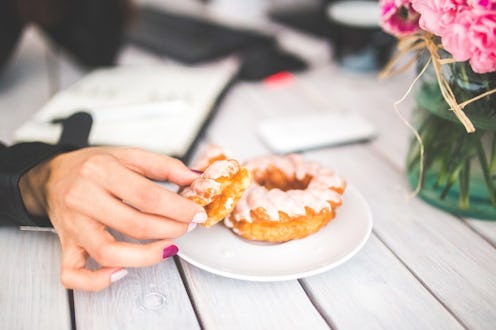Life
5 Weird Ways Women Food-Police Each Other

Whichever way you care to look at it, one thing remains clear: we collectively have a major issue when it comes to food and weight. The reason for this is pretty simple, but few people understand: weight is the way our bodies keep us "safe." It is our defense mechanism. Literally. A body that senses danger (stress) craves food and holds onto weight so as to prepare for what it translates "stress" to indicate: actual threat of survival. This was applicable, and valid, way back in the day. But introduce hormones, chemically altered foods, sky-rocketing rates of unhappiness, certain medications, a general fascination and obsession with being "small," and we have a whole cornucopia of stressors that are making us assume the perfect BMI = the perfect emotional contentment. (BMI is medically and scientifically BS, by the way.)
Let's be clear: the problem isn't the weight. "Fat" is a thing you have, not a thing you are. If anybody is claiming to care about your "health" because of your weight, do not listen. It's what we're taught is that weight matters. It weighs in a way that's mental and emotional and spiritual, almost. It's a nonsensical way people are conditioned to determine how "good enough" someone is — you can lie about bank balances and relationship statuses and overall levels of contentment, but weight is what you can see. So when we most feel emotionally threatened, or mentally vulnerable, or even physically unsure, we revert to trying to control our weight: it's not only the one thing we seemingly can control, it's also something that seems to spiral out of control when we're unhappy.
When you're in the pit of all this, it should come as no surprise that often we end up taking it out on each other. The way we're taught to police ourselves inevitably bleeds into how we police one another. So let's be clear about one thing, at least: another woman's food choices are not your concern, and taking your personal projections out on another person is not only not OK — it's an indication that you, my friend, have a bit of work to do on yourself.
For anybody who has ever felt "food policed," (the less-obvious cousin of "fat shamed"), and for people who may not realize they are doing it, here is your comprehensive guide to subtly belittling other people's behaviors, starting with the statements that sum them up, and why they are, frankly, BS.
"Do You Know How Many Calories That Has In It?"
Spoken under the sinister guise of "genuine concern," often people will try to inform you of how many calories something has in it, not because they actually want to stop you from eating it, but because they are so intensely forcing themselves to count every calorie consumed that it's unbearable to see someone else whimsically (or even mindlessly) just enjoying their lunch. The truth? Caloric intake is not a "one size fits all" situation. (That's a major problem with health ideas as they stand: the idea that 2,000 calories is right for everyone.) Unless you ask, someone informing you of what you're eating isn't just uncalled for, it's sad. Explain that you're perfectly capable of conducting your body and life in the way you please.
"Ugh, You're Eating A Salad? You're So Boring. Salad Is Gross."
The logic of this is simple: nobody else can tell or know what your taste buds find appealing, and quite frankly, it is none of their business what you choose to put in your body, no matter how they feel about it personally. You can respond with a short and cutting: "I enjoy this salad, thanks for trying to tell me how I feel!"
"I Would Never Eat That."
When someone says "I would never eat that" they're really saying: "I would never let myself eat that." When they genuinely would never eat something, they'll say: "Oh, I don't like [that food.]" You can respond by saying: "Good news! You don't have to."
"My Life Got Better When I Stopped Eating Like That."
The endless stories about how life gets better once calories are controlled and your body is successfully manipulated are as dangerous as they are psychologically false. You may feel better in the moment, but it's only because you've exerted a type of control that is not only impermanent, but most usually the symptom of a bigger problem. Changing your diet, or your body, will not fix the problem that drove you to want that in the first place. Your health, of course, is your priority. But real health is holistic, and begins with mindset, not a pant size. It doesn't happen in a genuine way until the mental/emotional issues that caused you to become unhealthy are addressed first. Chances are, if you have to communicate that your life got better because of it to someone who you perceive to need this particular method of self-help, those issues are most certainly not addressed. This is a quintessential example of what psychology calls a "shadow self." A projection based on what you are repressing and hiding within your own psyche.
"Do You Even Know What That's Made Of?"
Again, we're back to not actually being concerned with what something's made of, but really just wanting to suppress other people's happiness and (seeming) lack of control because seeing it brings to light... our own. It is your responsibility to know what's in your food, or not! It's the responsibility of farmers, stores and federal regulations. It is not the job of anybody else to dictate whether or not what you're consuming is morally or ethically sound... lest you begin to tell them about the consequences of being cunning and manipulative toward others.
Images: Pexels; Giphy